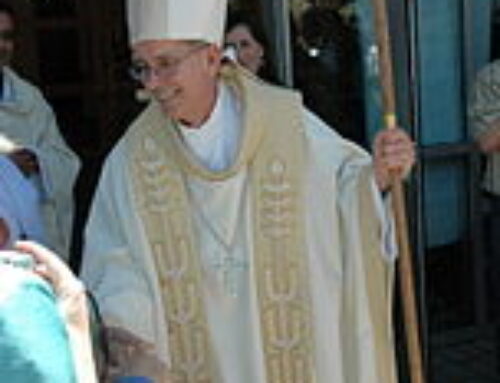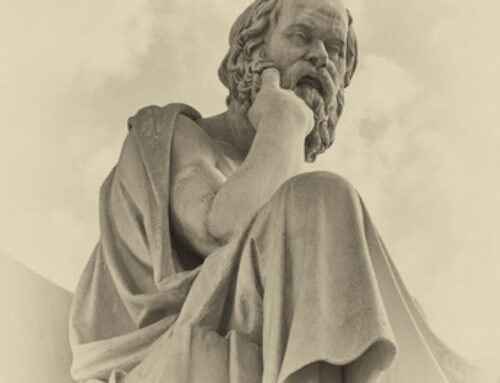 This question is being asked in parishes across the country, as a result of the efforts of Matthew Kelly and his “Mission Team” at the Dynamic Catholic Institute in Cincinnati. According to its website the Institute has reached over 20 million people with its “life changing” books. In addition, its Decision Point program has been used in 10,000 parishes making it “the most used Confirmation program in the United States.” And its “Find Your Greatness” seminars are so popular that parishes have difficulty scheduling them.
This question is being asked in parishes across the country, as a result of the efforts of Matthew Kelly and his “Mission Team” at the Dynamic Catholic Institute in Cincinnati. According to its website the Institute has reached over 20 million people with its “life changing” books. In addition, its Decision Point program has been used in 10,000 parishes making it “the most used Confirmation program in the United States.” And its “Find Your Greatness” seminars are so popular that parishes have difficulty scheduling them.
I recently attended one of those seminars conducted in my parish by Kelly’s associate Dr. Allen Hunt, a convert to Catholicism. It was standing room only.
Dr. Hunt began by stating “Our lives change when our habits change . . . You don’t stumble onto greatness.” Over the next three and a half hours he identified four “life-changing” habits: Prayer, which he called “Face-time with God”; Study, aimed at renewing one’s mind to know God’s will; Generosity; and Evangelization, which he described as simple “sharing of our faith with others,” unlike the more aggressive approaches of Mormons and Jehovah’s Witnesses.
Dr. Hunt’s presentation was well constructed and delivered, his anecdotes and analogies effective, even moving. The substance, however, seemed little different from that of a Pentecostal TV preacher. Later, as I reflected on the experience, I wondered whether with minor changes the seminar could be offered in Protestant churches as “Dynamic Baptist” or “Dynamic Lutheran,” or more generically as “Dynamic Christian.” In such cases, of course, the name of the Institute itself would have to be changed.
This line of thought led me to inquire more deeply into the Dynamic Catholic Institute (DCI) itself as well as the people who run it. Although Wikipedia has no listing for the Institute, it does have one for its founder, Matthew Kelly. Some years before founding DCI, he founded Floyd Consulting, named after his father and advertised as “Finally Living Out Your Dreams” and offering “executive coaching, public workshops, and onsite team events” to individuals and companies. Kelly is still a consultant at Floyd, which provides consulting services to more than 50 Fortune 500 companies. Floyd Consulting seems to have been inspired by Kelly’s upbringing in which “every night at the dinner table a broad range of topics was discussed, but particular attention and passion were focused on business and the art of being an entrepreneur.”
According to the DCI website, the other directors also have business backgrounds. Lamar Hunt Jr. is an American businessman, entrepreneur, sports promoter, and philanthropist. Patrick Joseph Burke is a financial advisor. Even Dr. Allen Hunt was a management consultant before being pastor of a protestant mega-church (and later a convert to Catholicism). What is surprising is that among the directors there is not a single individual with noteworthy credentials in Catholic doctrine and moral theology. I say “surprising” because the Institute presents itself as Catholic and Charity Navigator classifies it as a “Roman Catholic Religious Organization” with assets of $25,390,764.
DCI’s founder, Matthew Kelly, is the author of most of the books offered at the website (and also available at Amazon). A notable one is Rediscovering Catholicism, which explains the seven “Pillars of Catholicism”: Confession, Daily Prayer, The Mass, The Bible, Fasting, Spiritual Reading, and the Rosary. (The order seems random, with the Mass buried in the middle of the list, and the classification of Fasting as a “Pillar” of the faith is curious.) Kelly also has a CD of the Seven Pillars, in which he demonstrates superior word craft and appealing wit. His concept of “becoming the best version of ourselves,” which he frequently references, is a very useful metaphor for self-improvement. On the other hand, the modern parable he uses to explain Christ’s crucifixion has the father sacrificing of the son with no mention of the son’s willing acceptance of suffering and death. (See, in contrast, John 10:15-17-18.) Whether this omission was an oversight or a reflection of Kelly’s understanding of Scripture is not clear.
My search also revealed that DCI has, in addition to many devoted followers, some strong critics. One critic suggests that DCI seems less a ministry than a business. (Of course, ministry and business are not mutually exclusive.)
Another critic notes that DCI’s Decision Point makes no mention of Hell, purgatory, or sin; and only one mention of Satan or Original Sin. He goes on to argue that though intended for a high school audience, the program is written well beneath the level of comparable academic subjects and is “laced with modernism, rooted in emotionalism, and [written] to appeal to a Protestant mentality.” He adds, “The Church in general has been trying to appear more Protestant for the last 50 years” and that has resulted in “priest shortages, vocation declines, [and] parishes merging/clustering/closing. Becoming more Protestant won’t fix the problem.”
Kelly and his associates seem to have reasoned that catchy phrases, emotional appeals, and other Madison Avenue techniques have proven effective in selling goods and services, so they ought to be successful in motivating lukewarm or fallen-away Catholics to return to the Church.
The application of advertising strategies to Catholicism may be new, but the underlying idea is not. Norman Vincent Peale employed that idea in The Power of Positive Thinking, Positive Imaging, and You Can If You Think You Can. The same idea underlay Robert Schuller’s Power Thoughts, Self-Love: the Dynamic Force of Success, If It’s Going to Be It’s Up to Me, and The Power of Positive Energy. Ditto David Burns’ Feeling Good: The New Mood Therapy, Louise Hay’s You Can Heal Your Life, Dale Carnegie’s Make Yourself Unforgettable, David Schwartz’s The Magic of Thinking Big, Tony Roberts’ Awaken the Giant Within, and Cheri Huber’s Regardless of What You Were Taught to Believe, There’s Nothing Wrong with You. And so on.
The one thing these self-help books have in common, in addition to their exuberant stroking of the human ego (and their financial success) is their theme—You, reader, are absolutely wonderful, your potential is limitless, and you can achieve everything by yourself—which differs significantly from the Gospel message. Lamentably, the titles of some of Matthew Kelly’s books and programs, notably Find Your Greatness, and Perfectly Yourself, as well as the name of his institute, suggest some form of kinship with those self-help books.
Some might conclude that Dynamic Catholic Institute is using the Catholic Church’s problem in maintaining numbers for a purely commercial purpose. I think it is more probable that Kelly and his associates fervently believe in their message and its ability to make the Catholic faith more vibrant. I also believe DCI is making a meaningful contribution to Catholic renewal. For example, its four habits of Prayer, Study, Generosity, and Evangelization provide a helpful framework for Christian formation in general and Catholic formation in particular. (Other important habits could be added to DCI’s four, of course, including kindness, humility, and forgiveness.)
Nevertheless, I am concerned that DCI’s popularity may lead some bishops and parish priests to conclude that its contribution to Catholic renewal is sufficient in scope and, more importantly in depth, to overcome the decline in the number of Catholics who practice their faith. To do so, I submit, would be a serious misjudgment.
Copyright © 2018 by Vincent Ryan Ruggiero. All rights reserved


